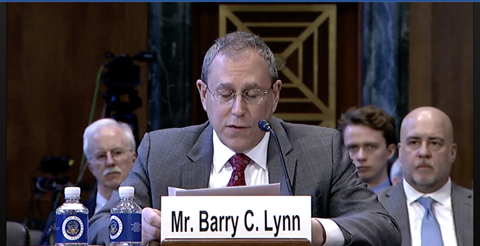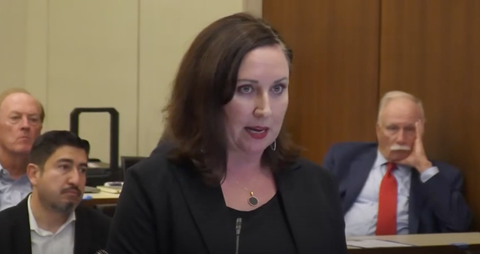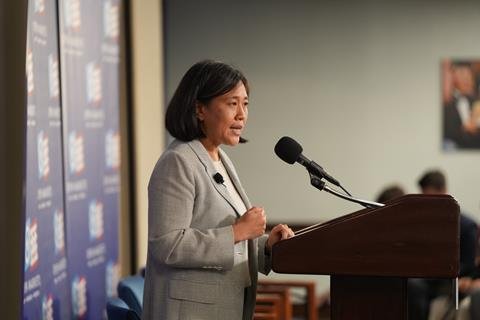The Corner Newsletter: December 20, 2023
Welcome to our final installment of The Corner for 2023. Over the course of the year, our team continued to drive the reinvigoration of antimonopoly law around the world, as well as policies reining in Big Tech. See some of the ways we did so below.
CONFERENCES
RENEWING THE DEMOCRATIC REPUBLIC
We hosted the “Renewing the Democratic Republic” conference on Feb. 15, in which featured speakers including Sen. Elizabeth Warren, Pulitzer Prize-winning playwright and author Ayad Akhtar, DOJ AAG Jonathan Kanter, and Sara Nelson, international president of the Association of the Flight Attendants-CWA, spoke not merely about the threats posed by monopoly, but how to build a truly better future once we win.
RETHINKING INDUSTRIAL TRADE POLICY
We hosted the conference “The Next World System: Can U.S. Trade Policy Make Us More Secure, Democratic, & Prosperous?” on June 15. U.S. Trade Representative Katherine Tai laid out a fundamental rethinking of U.S. trade policy, including boosting resilience in fragile supply chains and making sure WTO rules don’t stop law enforcers and policymakers from protecting democracy from Big Tech monopolists.
FAIR COMPENSATION FOR NEWS MEDIA
The Center for Journalism & Liberty at the Open Markets Institute convened Sen. Amy Klobuchar and Minister of Canadian Heritage Pascale St-Onge in September for our “Protecting News to Preserve Democracy” conference, which focused on the threats that Facebook and Google pose to the free press and democracy, and projects to force Big Tech companies to pay for the news they use.
AI IN THE PUBLIC INTEREST
In November, along with AI Now Institute, we cohosted the “AI and the Public Interest” conference featuring Federal Trade Commissioner Alvaro Bedoya, DOJ antitrust division deputy Doha Mekki, European Parliament member and Digital Markets Act author Andreas Schwab, and General Secretary of UNI Global Union Christy Hoffman, in a day-long discussion of the intersection of AI and monopoly power.
Competition achievements
FTC Advances Ban on Non-Compete Contracts
In January, years of advocacy by the Open Markets Institute culminated in the Federal Trade Commission’s publishing of a proposal to ban non-compete contracts designed to bind workers to specific employers. The FTC is expected to vote on a final version of the rule in April of 2024.
DOJ Challenges Google Advertising Monopoly
The Department of Justice filed in January an antitrust complaint against Google for monopolizing digital advertising technologies (“ad tech”), which connect advertisers with news publishers. The case, which will go to a jury trial in 2024, directly echoes concerns raised by our Open Markets team over the last 10 years, such as in our groundbreaking conference with Senator Warren in June 2016 and our Breaking the News conference in June 2018.
FTC Challenges Amazon’s Monopoly on Retail
The Federal Trade Commission and 17 states in September filed a lawsuit against Amazon for abusing its monopoly power in e-commerce. For more than a decade, Open Markets has advocated antitrust action against Amazon. FTC Chair Lina Khan began investigating Amazon’s monopoly power while on staff at Open Markets, work that led to her widely cited 2017 article on Amazon’s monopoly power for the Yale Law Journal.
Regulators Modernize Merger Guidelines
The Federal Trade Commission and the Department of Justice released the 2023 Merger Guidelines, approved with a vote of 3-0. The new guidelines mark the first action by U.S. law enforcers to restate the basic purposes and rules of competition since the Reagan administration. Beginning more than a decade ago, Open Markets was the first organization to call for abandonment of the deeply flawed “consumer welfare” philosophy introduced by Ronald Reagan and Bill Clinton, which unleashed the extreme concentration of power of recent decades.
Amazon/iRobot Deal Challenged in Europe
Amazon’s proposed acquisition of home robotics firm iRobot was challenged in July by the European Commission, which started an in-depth investigation that is still ongoing. Open Markets, alongside allies in Europe, urged the EC to review this deal given the risks it poses for competition in the market for smart home devices, since Amazon would access valuable user data to extend its dominance in this market.
Critical Hearings




CUTTING-EDGE WRITING & REPORTING
~
CUTTING-EDGE WRITING & REPORTING ~
Caroline Fredrickson, strategic councilor on democracy and power, wrote an article for The Atlantic, “What I Most Regret About My Decades of Legal Activism,” recounting her long career as a judicial advocate for social issues at the expense of economic ones like antimonopoly.
Executive director Barry Lynn wrote a cover story for the Washington Monthly that called for the elimination of dangerous chokepoints in international supply chains, grounding his argument in the history of U.S. industrial policy starting with the American Revolution.
Senior reporter Karina Montoya wrote a story for the Washington Monthly explaining how retailers are selling consumer data and earning juicy profit margins in the process with implications ultimately threatening the future of privacy and journalism.
Chief economist Brian Callaci published a think piece in The Atlantic on how Bidenomics is reversing four decades of economic orthodoxy led by the Chicago school that helped unleash dangerous concentrations of power and control in America.
Writing in Washington Monthly, policy director Phillip Longman called for reviving the dormant Robinson-Patman Act to address today’s wealth inequality and inflation.
Reporter Austin Ahlman published an article in The Intercept on the FTC’s about-face on the acquisition of Aerojet Rocketdyne, which the agency blocked when Lockheed Martin tried to buy it last year, in a decision that put the agency at odds with the Defense Department.
Europe director Max von Thun coauthored an article in The Guardian warning that the UK, as well as regulators around the world, needed to more effectively legislate the emerging AI space, rather than let Big Tech firms take the lead.
Senior legal analyst Daniel Hanley published an op-ed in the Democracy Journal on the unprecedented Supreme Court-led assault on administrative agencies, which is tantamount to a direct attack on responsive and democratic government.
Center for Journalism & Liberty director Dr. Courtney Radsch published an article in The Guardian arguing that the recent drama at the AI developer OpenAI — where CEO Sam Altman was fired and then rehired over the course of a long weekend — distracts from the real issue at stake, which is Big Tech’s tight grip over the emerging AI space.
Food systems program director Claire Kelloway coauthored an article for The American Prospect that dismissed the idea that antitrust law enforcers should approve a merger between Kroger and Albertson’s based on corporate promises to divest stores in a few markets, saying divestitures actually drive up prices.
Legal director Sandeep Vaheesan published an op-ed in The New Republic urging federal agencies to address the control Amazon exerts over workers and businesses that ostensibly lay beyond its corporate boundaries.
Audrey Stienon, who manages our industrial policy program, wrote a lead story for The Corner exploring how private equity titans have been quietly deploying classic rollup strategies that limit competition and raise prices across the care economy, including day care centers.
Pivotal Papers
AI in the Public Interest: Confronting the Monopoly Threat
Open Markets executive director Barry Lynn, Europe director Max von Thun, and senior reporter Karina Montoya expose the risks of letting large-scale AI continue to unfold in a concentrated market, and how existing antitrust, competition and other laws can be wielded to correct harms exacerbated by AI. (See more).
How to Fund Independent News Media for the 21st Century
The Center for Journalism & Liberty documents the last few years of Big Tech's war on the free press and lays outs how to use traditional U.S. competition policy to restructure media markets. In a complementary paper, senior legal analyst Daniel Hanley gives the history of how antimonopoly has always been critical to America's media competition policy. (See more).
Greenwashing Big Ag
In this report, food systems program manager Claire Kelloway reveals how a new bipartisan law claiming to tackle greenhouse gas emissions instead just helps the agriculture industry launder its reputation and entrench their market power. (See more).
Two Papers Calling for Revival of Robinson-Patman Act
Open Markets legal director Sandeep Vaheesan, senior legal analyst Daniel Hanley, and chief economist Brian Callaci make the case for the U.S. government to revive enforcement of the Robinson-Patman Act (RPA) in order to help build a fairer, more open, and more decentralized economy. (See more).
Peanut farmers join forces against “Big Shell.”
In a report published by the Open Markets Institute, chef Kiki Louya examines the peanut industry, where farmer-owned cooperatives like Premium Peanut have seen great success taking on the giant shelling monopolies. (See more).
COALITION WORK
Open Markets worked with Food & Water Watch in January on comments to the US Department of Agriculture over new pro-competition rules the department proposed under the Packers and Stockyards Act. Open Markets also submitted an additional set of comments.
In April, Open Markets led a coalition of 50 labor and public interest groups in April on a joint comment urging the Federal Trade Commission to ban non-compete clauses and training repayment agreement provisions (TRAPs).
Open Markets worked with European civil society groups again in May when it led a joint submission to the European Commission on the role third parties must play in implementing and enforcing the European Union’s new Digital Markets Act.
Open Markets and its affiliate Center for Journalism & Liberty in May joined media experts and civil society groups from around the globe in signing onto Principles for Fair Compensation in Journalism & Big Tech. Center for Journalism & Liberty director Dr. Courtney Radsch helped craft the principles at a conference at the Gordon Institute of Business Science in Johannesburg, South Africa.
In August, in coalition with the Authors Guild and the American Booksellers Association, Open Markets sent a letter to the Department of Justice and the Federal Trade Commission urging greater enforcement efforts to combat Amazon’s book monopoly.
Open Markets partnered with labor unions and a host of other civil society organizations on a comment to the Federal Trade Commission’s proposal to alter merger guidelines in September. The comment commended the draft guidelines’ positive changes, but it also presented the commission with several ways to strengthen and clarify the proposed guidelines.
And in December, Open Markets continued its work on the UK’s Digital Markets, Competition and Consumers Bill by working with European working with Foxglove and Balanced Economy Project on a submission calling for targeted improvements to the revised bill that would prevent Big Tech corporations from circumventing its requirements.















